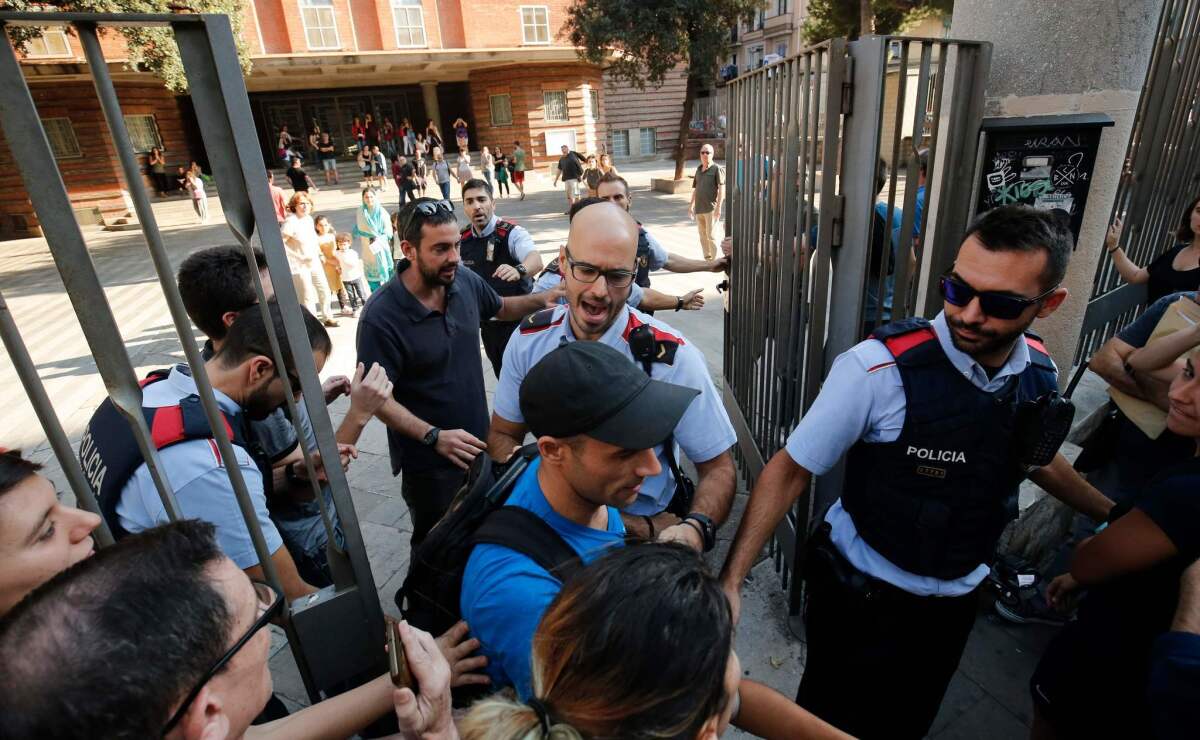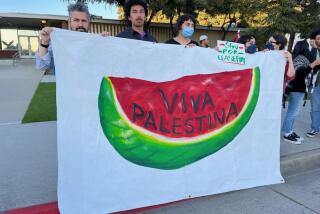Spain resists Catalonia’s push for independence, aims to stop vote scheduled Sunday

For the last week, Mariona Fontarnau has slept under stone arches in the courtyard of the University of Barcelona, occupying the building with hundreds of other students as a gesture of solidarity with Catalan separatists.
Draped between columns above her head is a banner that reads: “The future is ours,” in the local Catalan language.
At 19, she’s not old enough to remember the repression of Catalans under the nearly 40-year rule of dictator Gen. Francisco Franco, who died in 1975. But she’s grown up hearing her parents’ and grandparents’ recollections.
Her own memories are more recent, of Spain’s economic crisis, in which she came of age and in which younger Spaniards suffered job losses disproportionately.
More than 100 miles west, Joaquim Paladella, 56, watched news reports about the Barcelona students’ campout and street rallies from his desk at the town hall of Batea, a sandstone village in Catalan wine country where he’s been mayor half of his life.
In elections, he’s usually responsible for setting up ballot boxes in the basement of the town hall. But he’s refused to do so this Sunday. Paladella opposes Catalonia’s independence referendum and will not allow voting in municipal buildings.
On Friday, he locked the door and left the key with his secretary.
Fontarnau and Paladella are on opposite sides of an independence debate in Spain’s northeast region of Catalonia, where leaders plan to hold a referendum Sunday on whether the region should secede from Spain. Opinion polls show Catalans are roughly divided 50-50 over whether to break with Spain.
One of Spain’s 17 autonomous regions, Catalonia has a population of about 7.5 million people and is the country’s most prosperous region. The regions set policy for some services, such as healthcare and education, but rely on the central government for tax collection, and many Catalans resent having their taxes subsidize poorer areas.
Catalonia also has its own language and culture.
Some Catalans who yearn for a future free from Spanish rule have vowed to cast ballots. Others, heeding the central government’s warnings that the referendum is unconstitutional, plan to stay home.
Whatever the turnout, Spain has said the vote is illegal. No country has said it would recognize an independent Catalonia.
But the referendum, even if it is rendered only symbolic, represents Europe’s most serious territorial dispute in years. Separatist leaders have said they’ll declare independence from Spain within 48 hours, if the “yes” votes win.
Thousands of Spanish police, redeployed from all over the country, are billeted on ferry boats in Barcelona’s port, under orders to surround polling stations and empty them out by 6 a.m. Sunday.
Most of the polling places are in public schools. Parent-teacher associations invited families sympathetic to the separatists to sleep overnight Saturday inside school buildings, to “occupy” the schools and confront police the following morning.
Dozens of teachers jingled keys — purportedly, the keys to schools across the region — over their heads at a rally Friday in Barcelona. Farmers drove about 100 tractors, draped in separatist flags, into the city from the surrounding countryside.
Late Friday, Spanish media reported the chief of Catalan police had sent a document to all officers, instructing them not to use force against any civilians.
Spanish Civil Guards, part of a national paramilitary force, seized nearly 3 million ballot papers Friday from a warehouse north of Barcelona. It was the latest in several such raids in the last 10 days, on printing presses and storage facilities where referendum materials were being prepared.
“I insist that there will be no referendum on Oct. 1,” Iñigo Mendez de Vigo, a spokesman for the Spanish central government, told reporters Friday in Madrid.
Meanwhile separatist leaders debuted ballot boxes at a rival news conference in Barcelona. They said 2,315 polling stations were set up across Catalonia, with more than 6,000 voting tables and more than 7,000 staff involved.
Spanish Civil Guards detained 14 Catalan separatist officials on Sept. 20 for their roles in organizing the referendum — sparking 10 days of often riotous protests in response.
Prosecutors have said they may levy abuse of power charges against more than 700 Catalan mayors who agreed to allow voting in public buildings, and sedition charges against the leaders of pro-independence street rallies.
“We don’t care. We want to vote. We want democracy,” Fontarnau said Thursday, sitting cross-legged on a sleeping bag in the university courtyard. “Since I was born, I have felt Catalonia should be independent. Spain is not our country. It’s about the language and the culture, and how we are treated by Spain.”
As Spain transitioned to democracy in the late 1970s, regions like Catalonia won control over their schools.
“The first thing they did was immersion. This means you teach everything in Catalan, including math and biology,” said Enric Ucelay-Da Cal, a Barcelona-based historian and expert on the Catalan independence movement. “It’s all done in Catalan. That is still the case now.”
Fontarnau grew up in that system, and cites her Catalan language as the main reason she feels different from other Spaniards.
“My language is everything for me. I speak Spanish as well, but speaking Catalan, for me, it’s my identity — telling who I am, and explaining to the world, this is my language. It’s not Spanish.”
In the last 40 years, Catalonia has become Spain’s richest region, with the tourist hub of Barcelona as its capital. The Catalan economy comprises about 20% of Spanish gross domestic product, and more than a fifth of Spain’s exports.
Paladella doesn’t back secession.
“I just don’t see how independence would help my village,” the Batea mayor said in an interview this week at town hall. He is one of about 200 Catalan mayors who refused to allow voting in public buildings.
“When Catalan regional leaders wave the separatist flag and lobby for independence, they’re not doing the real work of government,” he said. “I am a Catalan, but I’m deeply discontented with the direction my region is taking.”
Frayer is a special correspondent.
ALSO
Hundreds of thousands march in Barcelona for Catalonia independence
Legislators object as Iraqi Kurds vote overwhelmingly to secede
In Spain, police suspect the seed for recent Islamic State attacks was planted years ago
More to Read
Start your day right
Sign up for Essential California for news, features and recommendations from the L.A. Times and beyond in your inbox six days a week.
You may occasionally receive promotional content from the Los Angeles Times.






